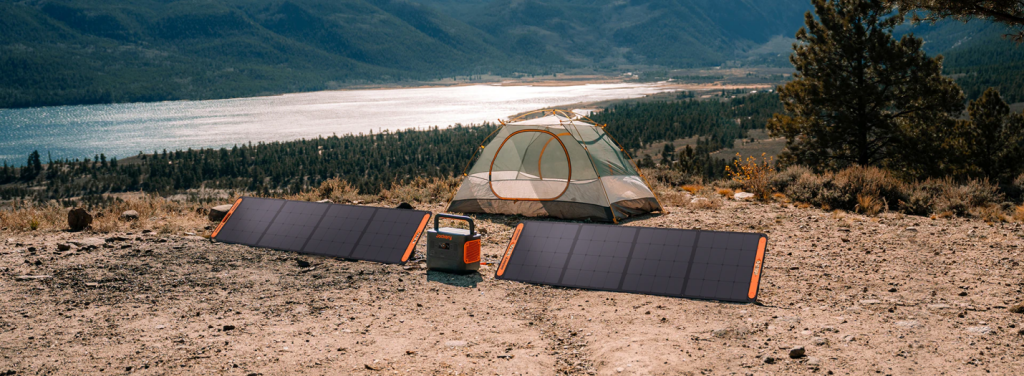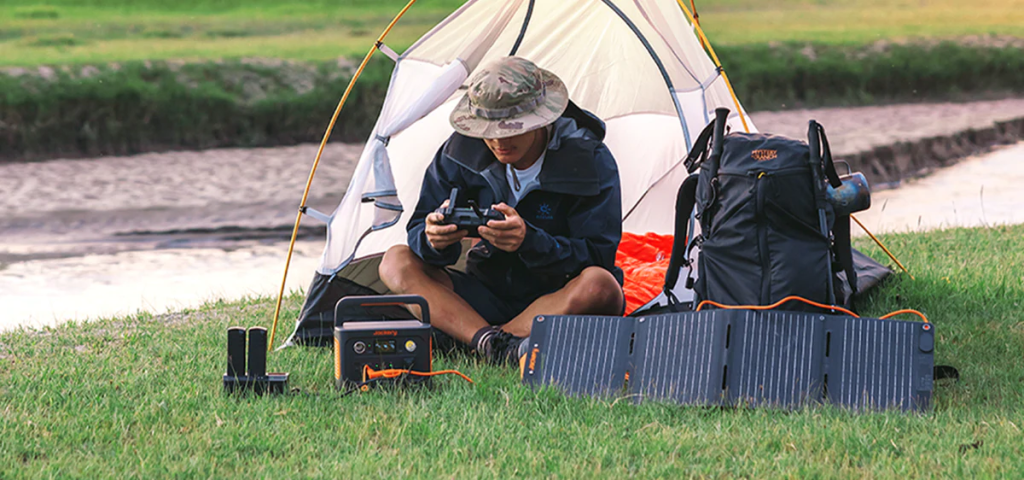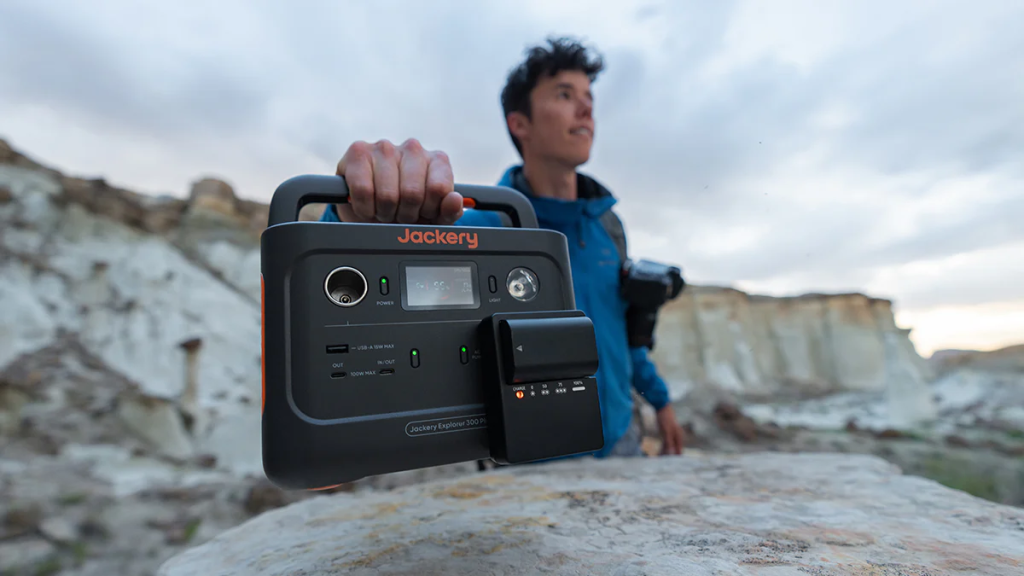Primitive camping is an outdoor activity that returns to nature and experiences a simple lifestyle. It emphasises intimate contact with nature and minimal reliance on modern amenities.
Campers usually do not use existing camping facilities such as cabins and power supplies but rely on their tents, sleeping bags, solar generators, and cooking tools. This camping method allows participants to experience nature more deeply and enjoy the tranquillity of solitude.
The main difference between primitive camping and traditional camping lies in the use of facilities and convenience. Traditional camping generally has camping sites with supporting services, while primitive camping emphasises self-sufficiency and has a minimal impact on the environment.
This article will take you deep into primitive camping and help you explore the challenges associated with it. It will provide you with a comprehensive checklist for your next primitive camping experience to make your life easier.

What is Primitive Camping?
Primitive camping is the raw form of camping that involves setting up your tents in remote areas far removed from the typical campgrounds that are equipped with modern amenities. This camping method means there is no instant access to running water, electricity, or restrooms.
Instead, it tests your survival skills and exposes you to the natural environment in the most raw form possible. Campers carry all their essentials and a small electric generator on their backs to go to locations that offer a true escape from the luxurious urban environment.
This type of camping requires preparation, mental fortitude, and a willingness to forgo the comforts of modern life for the sake of a unique and enriching experience.
What are the Principles of Primitive Camping?
Due to its distinctive nature, there are some exclusive principles of primitive camping that every camper must follow to make the whole practice healthy. These principles include:
1. Principle of Leaving No Trace
Primitive camping strictly follows the doctrine of “take only photos, leave only footprints.” Campers are always expected not to leave any trace behind to minimise their impact on the natural surroundings and preserve everything for future generations.
This essentially means that you will need to pack out all trash before leaving to avoid disturbing natural features and wildlife.
At an individual level, these efforts do not require much time but will surely do wonders if every camper does the same thing after camping.
2. Principle of Self-sufficiency
This principle requires campers to be fully prepared and independent by carrying all necessary supplies, such as food, water, shelter, and safety equipment.
It emphasises the significance of planning and preparation as well as the ability to rely on one’s skills to navigate, create shelter, and manage sustenance without external aid.
Self-sufficiency will be easier if you carry equipment like a solar generator that will keep all your electronics powered when you are camping out there.
3. Principle of Respect for Wildlife
Every camper must maintain a safe and reasonable distance from animals, refrain from feeding them, and avoid disrupting their natural habitats. Disturbing wildlife has negative consequences for both you and the animals, which makes it necessary to act as responsible citizens who observe wildlife without causing harm or stress to them.
Moreover, many jurisdictions have laws regarding wildlife, and breaching those laws will also push you into legal trouble.
4. Principle of Environmental Protection
Protecting the environment involves understanding the ecological aspects of the camping area, such as water sources and vegetation, and ensuring that your camping practices do not lead to any degradation of natural resources.
A common example of destroying the natural environment during primitive camping is using soaps and lotions near waterways, which contaminate them and pose health hazards for those using the same water downstream.
Participating in conservation efforts or clean-up drives is a way to save the environment around you.
What’s the Pros and Cons of Primitive Camping?
Now let’s see what the advantages and disadvantages of primitive camping are.
1. Advantages of Primitive Camping
First of all, this type of camping gives you an opportunity to make unparalleled connections with nature. It allows you to immerse yourself fully in the natural surroundings, far away from the hustle and bustle of city life.
Next, it opens up opportunities to explore less-travelled paths and discover landscapes that only a few daring individuals have ever explored before. The freedom associated with setting up camp in the wilderness is a highly liberating experience.
Primitive camping is also an excellent way to enhance survival skills. Each trip requires campers to utilise and improve their abilities in building shelters, finding food and water, and navigating unfamiliar territories. These skills make the camping experience more fulfilling and instill a strong sense of self-reliance in your personality.
Furthermore, primitive camping is also a cost-effective way of camping, as it eliminates the need for expensive campsite fees by offering a budget-friendly adventure option.
2. Challenges of Primitive Camping
However, primitive camping also comes with numerous challenges, the foremost of which is the level of preparation required.
Unlike traditional camping, where you already have a lot of amenities, primitive camping demands thorough planning, from route mapping to packing all necessary supplies for survival. Campers who are not trained for these experiences can find it difficult when they face this toughness.
Moreover, the skills required for successful primitive camping are more extensive and demanding. Campers must know how to effectively manage everything, like food storage, ensuring safety from wildlife, and mastering environmental navigation without the usual markers or signs.
The requirement for more living skills and the necessity for rigorous preparation make primitive camping a challenge.
How to Prepare for Primitive Camping?
As you begin your journey of primitive camping, here are the things to do:
1. Selecting Your Destination
The first step in arranging a primitive camping adventure is to carefully select your destination. This choice should reflect a balance between your camping proficiency and the type of challenge you seek. Extensive research about the possible camping spot is an extremely important step at this stage.
Delve into details regarding the geography of your spot, typical wildlife encounters, accessibility, and any potential hazards. You will also need to keep an eye on the seasonal weather conditions to choose the optimal time for your visit.
2. Gathering Necessary Equipment
For a successful and safe primitive camping journey, equipping yourself with the right tools is a must. Essential gear includes a tent, nutritious food supplies, an all-encompassing first aid kit, dependable navigation devices, and a solar generator for your power needs.
Select each piece of equipment with care after considering its utility, portability, and user-friendliness in remote environments. Prior to departure, take time to familiarise yourself with your gear by practicing its setup and using it to avoid any trouble during the adventure.
3. Licensing and Permits
Before going out, it is important to verify whether your chosen camping site requires a permit or a license. These regulations are often in place to help conserve the environment and manage the area’s ecosystem by controlling the number of visitors.
Sometimes, authorities also introduce permits to warn you about the potential consequences that come with camping at that specific site. Reach out to local land management offices or explore their online resources to secure any necessary documentation.
Understanding and complying with these rules not only avoids legal issues but also supports conservation efforts in that area.

Solar Generators Suitable for Different Camping Needs
Carrying a portable solar power generator on a primitive camping trip takes a lot of burden off your shoulders.
Here are two top-notch solar generator UK setups that are specifically designed for outdoor explorations and daring adventures.
1. Jackery Solar Generator 300 Plus
This portable power station UK has changed the way Britishers camp. Here is why:
● Compact and Portable Power Source
The Jackery Solar Generator 300 Plus is a companion for any primitive camping or road trip adventure. The bundle is an integrated packaging solution for energy storage and solar panels. Its Jackery Explorer 300 Plus Portable Power Station weighs only 3.75kg (8.27 lbs) and the Jackery SolarSaga 40 Mini solar panel weighs 1.2kg (2.6 lbs), which perfectly fits into your backpack.
Its lightweight design never means that this small electric generator does not have enough capacity. With its 288Wh capacity and 300W output, this generator is enough to power your essential devices when you are busy exploring the wild.
● Advanced Safety Features
This solar electric generator comes with state-of-the-art Battery Management System (BMS) algorithms, which protect your devices against overcharging, overheating, and other potential hazards, so you are not left with a faulty device when you are out in the wild.
Its safety is further shown in its material, which is rated at UL 94V-0 for flame retardancy and Class 9 for impact resistance.
● Longevity and Reliability
The long-lasting LiFePO4 batteries in these solar generators provide a longer lifespan, even if recharged frequently.
This longevity is also supported by the generator’s ability to maintain a constant voltage and produce a pure sine wave, which empowers it to safely power a wide range of electrical appliances.
● Versatile Charging Options
The Jackery Solar Generator 300 Plus offers multiple charging methods to suit any need. When you are on a primitive camping trip, charging it through solar panels is the best way.
Otherwise, the generator can also be charged with a wall socket or a car charger. The inclusion of MPPT technology maximises solar charging efficiency, which also helps you do a speedy recharge of the system.
● Connectivity and Control
Managing the Jackery Solar Generator 300 Plus is effortless, thanks to its smart app control. You can connect to the generator easily and monitor its status, control its features, and optimise its performance directly from your smartphone.
2. Jackery Solar Generator 1000 Plus
The Jackery Solar Generator 1000 Plus redefines portable power with its impressive capacity and output. Its top features include:
● Remarkable Capacity
The 1260Wh capacity and powerful 2000W output of the Jackery Solar Generator 1000 Plus can power all the devices you will need during a primitive camping adventure. These devices include, but are not limited to, an electric stove, portable refrigerator, phone, laptop, and fans.
● Expandability and Longevity
Another useful feature of the Jackery Solar Generator 1000 Plus is its expandable capacity, which allows you to scale the system as your power needs increase. The unit supports up to three additional battery packs, which makes it expandable up to 5kWh.
With its highly sophisticated LiFePO4 battery cells, the system has been able to work perfectly for more than ten years.
● Industry-leading Sustainability
The Jackery Solar Generator 1000 Plus sets new benchmarks for environmental sustainability in portable power. It was verified by TÜV SÜD for its eco-friendly credentials. Thus, you are guaranteed to fulfil your responsibility of engaging in sustainable camping practices without damaging the environment.
● Fast and Versatile Charging Options
Due to its multiple charging options, the Jackery Solar Generator 1000 Plus will always be charged whenever you need it.
It can be fully charged via solar panels in just 2 hours when using four Jackery SolarSaga 200W solar panels. Alternatively, it can be charged through a wall outlet in about 100 minutes and supports charging via a car outlet as well.
● Intelligent Control and Safety
This model is equipped with an advanced APP feature, which empowers you to control it conveniently. The integrated ChargeShield technology and stable power output ensure that all connected devices are safely powered with a constant voltage and pure sine wave to prevent any damage to your devices.

Wrapping-Up
Jackery solar generators bring an opportunity for primitive campers to explore their natural surroundings while pushing their limits without stepping into a dangerous territory where they have no access to electricity.
During primitive camping adventures, you will need different electronic gadgets to make your experience worthwhile. And that is where Jackery solar generators will rise to the occasion to solve your electricity needs. Select one on their website to prepare for your next camping adventure!

